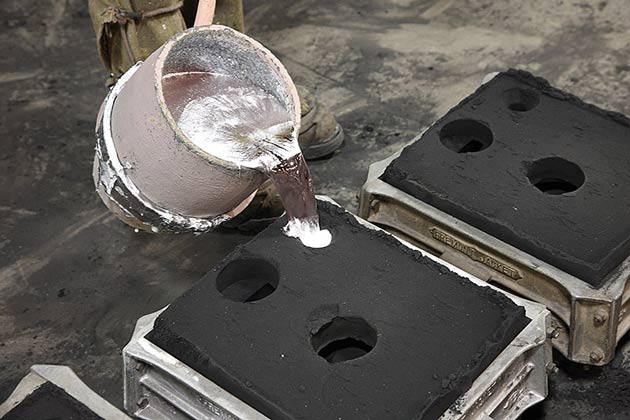Things about Stahl Specialty Company
Things about Stahl Specialty Company
Blog Article
Some Ideas on Stahl Specialty Company You Should Know
Table of ContentsAll about Stahl Specialty CompanyAll About Stahl Specialty CompanyUnknown Facts About Stahl Specialty CompanyFacts About Stahl Specialty Company RevealedThe Basic Principles Of Stahl Specialty Company
The subtle difference depends on the chemical web content. Chemical Contrast of Cast Light weight aluminum Alloys Silicon advertises castability by decreasing the alloy's melting temperature level and enhancing fluidity during spreading. It plays a critical function in allowing elaborate molds to be filled properly. Additionally, silicon adds to the alloy's stamina and put on resistance, making it beneficial in applications where toughness is important, such as auto components and engine components.It also enhances the machinability of the alloy, making it much easier to refine into finished products. In this method, iron adds to the total workability of light weight aluminum alloys. Copper enhances electrical conductivity, making it advantageous in electrical applications. It likewise enhances deterioration resistance and includes in the alloy's overall toughness.
Manganese contributes to the stamina of light weight aluminum alloys and enhances workability. It is commonly utilized in wrought light weight aluminum products like sheets, extrusions, and accounts. The visibility of manganese help in the alloy's formability and resistance to fracturing throughout fabrication procedures. Magnesium is a light-weight element that supplies stamina and effect resistance to aluminum alloys.
It enables the production of lightweight elements with superb mechanical homes. Zinc boosts the castability of aluminum alloys and helps control the solidification procedure during spreading. It boosts the alloy's strength and firmness. It is frequently located in applications where detailed shapes and great details are needed, such as decorative castings and certain automobile parts.
Facts About Stahl Specialty Company Uncovered
Because aluminum-silicon alloys have good casting residential properties, high gas homes, basic procedures, and superb rust resistance, aluminum-silicon alloys are most generally utilized in the die-casting sector in your home and abroad. At the same time, aluminum-silicon alloys are also fairly early and extensively recognized alloys developed and made use of in die-casting. After continual research and enhancement, most of the current international mainstream aluminum-silicon alloys have been finalized and are nothing greater than A356, A360, A380, ADC12, B390, and A413.
The main thermal conductivity, tensile toughness, return strength, and elongation differ. Select ideal resources according to the efficiency of the target item created. Amongst the above alloys, A356 has the highest thermal conductivity, and A380 and ADC12 have the most affordable. The tensile restriction is the opposite. A360 has the best yield toughness and the greatest prolongation rate.

The Main Principles Of Stahl Specialty Company
In precision spreading, 6063 is appropriate for applications where elaborate geometries and top quality surface finishes are vital. Instances include telecommunication rooms, where the alloy's premium formability enables streamlined and cosmetically pleasing styles while keeping structural integrity. Likewise, in the Lights Solutions sector, precision-cast 6063 parts produce stylish and effective illumination site link fixtures that call for detailed shapes and excellent thermal performance.
(https://papaly.com/categories/share?id=c26321f23f6c4357aeb3039fb1053821)
It causes a finer surface coating and much better corrosion resistance in A360. The A360 displays remarkable elongation, making it perfect for complex and thin-walled elements. In precision casting applications, A360 is fit for sectors such as Customer Electronics, Telecommunication, and Power Tools. aluminum metal casting. Its boosted fluidness enables elaborate, high-precision elements like mobile phone casings and communication tool real estates.

In precision spreading, light weight aluminum 413 radiates in the Consumer Electronics and Power Devices sectors. This alloy's superior rust resistance makes it a superb choice for outside applications, making certain durable, resilient items in the pointed out industries.
Getting My Stahl Specialty Company To Work
Once you have made a decision that the aluminum die casting process appropriates for your project, an important next step is selecting the most suitable alloy. The light weight aluminum alloy you choose will significantly affect both the casting process and the residential properties of the last item. Since of this, you must make your choice thoroughly and take an educated technique.
Figuring out the most appropriate aluminum alloy for your application will imply evaluating a wide selection of characteristics. The initial classification addresses alloy attributes that affect the production process.
The alloy you select for die casting directly affects several facets of the spreading procedure, like how simple the alloy is to function with and if it is susceptible to casting problems. Hot splitting, additionally understood as solidification splitting, is a normal die casting defect for light weight aluminum alloys that can result in inner or surface-level splits or cracks.
The Facts About Stahl Specialty Company Revealed
Particular light weight aluminum alloys are more prone to hot splitting than others, and your choice should consider this. An additional typical issue discovered in the die casting of light weight aluminum is die soldering, which is when the cast adheres to the die walls and makes ejection tough. It can harm both the actors and the die, so you need to look for alloys with high anti-soldering residential properties.
Corrosion resistance, which is already a significant quality of aluminum, can differ substantially from alloy to alloy and is a vital characteristic to consider depending upon the ecological conditions your product will be subjected to. Wear resistance is another home frequently sought in aluminum products and can distinguish some alloys.
Report this page